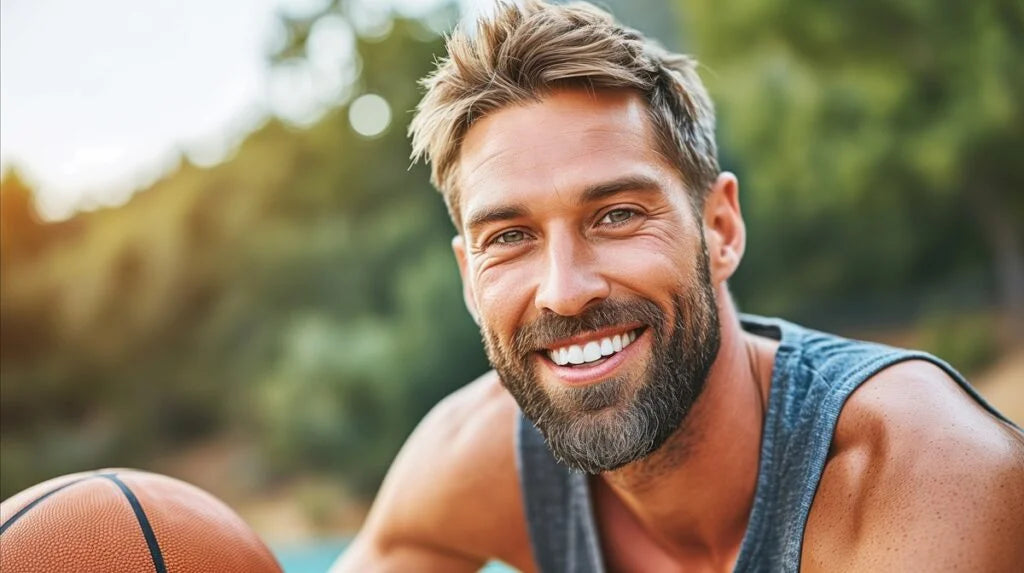
Noticed your first gray hairs and wondering why it’s happening so early? You’re not alone! Premature graying is a topic that raises many questions. Here, we explain what this phenomenon is, what causes it, and how you can manage it. Keep reading to learn about prevention and camouflage methods, and how graying can affect your confidence and well-being.
What is graying at a young age?
Premature graying, while it may seem unusual, is becoming more common. It doesn’t only affect older individuals—it often surprises young, healthy people who find their first gray strands earlier than expected. Generally, it’s the process where hair loses its natural color due to a decline in melanin production—the pigment responsible for the color of your skin, eyes, and hair.
When this happens early, often before the age of 20, it’s referred to as premature graying. The causes vary, including genetics, stress, poor diet, or certain medical conditions. It’s important to remember that graying is a natural part of aging that can simply occur earlier in some people. While the first gray hairs may be frustrating, it’s good to remember that we’re all different—and our individuality is also expressed through our hair.
Causes of premature graying of hair
Graying hair at a young age can be caused by various factors. The most common causes include:
- Genetics – Greying is often inherited. If your parents started greying at an early age, there is a chance that you may also experience it early.
- Stress – Although it may be hard to believe, stress can accelerate the graying process. Nervous tension can disrupt the natural growth and coloring cycle of hair.
- Health – Sometimes graying of hair at a young age may be a sign of health problems such as nutritional deficiencies, thyroid problems or autoimmune skin diseases.
- Lifestyle – An unhealthy diet, lack of sleep, alcohol and drug abuse can also contribute to premature greying.
It is worth noting that each situation is different and the causes graying of hair at a young age can be diverse. Regardless of the reason, it is important to eat healthily, take care of your well-being and consult a doctor or dermatologist if you experience gray hair at an extremely young age to rule out potential health problems.
Going Grey at 20 – Is It Normal?
Seeing gray hair in your twenties can be surprising, but it’s not as rare as you might think. While relatively few people experience it this early, it does happen—and both genetics and lifestyle factors can be involved.
What’s important to remember is that graying at 20 isn’t something to be ashamed of. Sometimes it’s due to stress, chronic conditions, or poor nutrition—factors that can often be addressed and improved. In other cases, it’s simply part of your unique genetic makeup.
Graying is a natural process. It may begin earlier in some people and later in others. Facing this process with confidence and self-acceptance is essential. And remember, if you have concerns, don’t hesitate to speak with a healthcare professional.
How to prevent graying at age 25?
Noticing gray hair at 25 can be surprising—but remember, everyone ages differently. Still, there are steps you can take to try to delay the process.
Start with healthy eating habits. A diet rich in B vitamins and minerals supports hair health and melanin production. Regular exercise and stress management (such as meditation or yoga) can also help—since stress is a known contributor to early graying. Avoiding alcohol, tobacco, and drugs is equally important.
Keep an eye on your overall health. If something doesn’t feel right or the graying is sudden and rapid, consult a doctor. Sometimes gray hair is an early sign of another condition. Regular check-ups with your doctor or dermatologist are key.
Graying at 25 isn't abnormal—but it’s worth finding out the cause and addressing it accordingly. And don’t forget—self-acceptance matters most. Every change, even something as ordinary as a gray hair, is part of your unique journey.
Methods to combat gray hair at age 30
Noticing gray hairs in your 30s and looking for effective solutions? First, focus on a healthy lifestyle. A diet rich in vitamins (especially B-complex) and minerals like zinc and copper is essential for maintaining hair health. Exercise, walks in nature, meditation, or yoga can also help reduce stress—one of the key factors behind graying at this age.
There are also many cosmetic products designed to support and nourish the hair—shampoos, masks, oils, and anti-graying treatments can help. Look for natural, chemical-free options.
Hair dyeing is a common solution. But if you prefer more natural approaches, henna or coffee-based dyes can be great alternatives.
No matter the method, remember: graying at 30 is a normal part of life, and nothing to be embarrassed about. Health and self-love should always come first. And again, if you’re unsure, speak with a doctor or dermatologist.
Psychological aspects of going gray at a young age
Premature graying can have a psychological impact. It may cause stress, anxiety, and lower self-esteem—especially in a society that emphasizes staying youthful for as long as possible.
Here are a few things to keep in mind:
- Gray hair is natural and does not define your worth or youth.
- Self-acceptance and embracing your uniqueness are crucial to mental well-being.
- If graying causes emotional discomfort, consider speaking with a therapist or psychologist.
There are many ways to cope with these feelings, and support is available. Graying at a young age is nothing to be ashamed of.